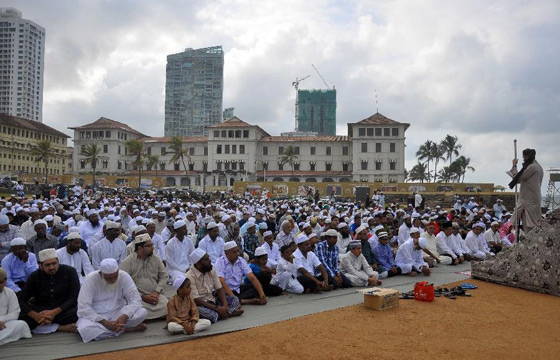|
Eid-ul-Fitr signifies end of month-long fast:
A time to celebrate
By Jainudeen Ahamath
The month of fasting will come to a close in a few days and Muslims
around the globe will celebrate the Eid –Eid-ul- Fitr. This festival
signifies the end of the month-long fast observed by Muslims the world
over. Fasting brings to mind the hunger and hardship felt by many who
are unable to afford a square meal for the day. It is a time for
introspection. A time to think about the lives we lead and the wanton
waste that some Muslims indulge in. Fasting is not merely staying away
from food.
It is abstaining from every type of immoral activity and giving
physical rest to the body.
The first day of Shawwal, the month which follows Ramazan in the
Islamic calendar is the day on which the festival is celebrated. It is a
time to give in charity to those in need, and celebrate with family and
friends the completion of a month of blessings and joy.
|

File photo:Eid prayers at the Galle Face Green |
Before the day of Eid, during the last few days of Ramazan, each
Muslim family gives a determined amount as a donation to the poor.
This donation is of actual food -- rice, barley, dates, rice, etc. --
to ensure that the needy can have a holiday meal and participate in the
celebration. This donation is known as Sadaqatul Fitr.
On the day of Eid, Muslims gather early in the morning in outdoor
locations or mosques to perform the Eid prayer. This consists of a
sermon followed by a short congregational prayer.
After the Eid prayer, Muslims usually scatter to visit various family
and friends, give gifts especially to children,
Fasting is obligatory on all Muslims other than the old and the
infirm. Millions of Muslims throughout the world observe fasting in the
month of Ramazan while giving charity to the poor and needy.
By fasting they not only abstain from consuming food and drink, they
also subject themselves to some strict disciplinary process to control
their feelings and sentiments. Even in serious provocative situation
they should not get angry and should not be tempted by sexual desires.
They should not entertain any form of envy and take control f their
baser tendencies and should not envy others. They would not indulge in
unnecessary talks, know in seeking sensual pleasures. They engage in
prayer and religious activities, those who have wealth should engage in
charitable deeds. Zakath which is a compulsory tax laid down in the
Quran and is expected to be carried out in the prescribed manner so tat
the less privileged will be able to reap the benefit. It is a two-way
ideal where he benefactor and the beneficiary will benefit. The
quantities and amounts are set out in detail. Zakath can be distributed
throughout the year but many people prefer to distribute it in the month
of Ramazan to reap more reward. Sadaqa can also be given during Ramazan
In addition there is a compulsory distribution of the staple food where
the measure is also prescribed. In Sri Lanka since the staple food is
rice two and a half measures of rice is prescribed for each adult and
should be distributed before the Festival prayer. This alms is known as
Sadaqathul Fitr.
For pious Muslims it is a month to seek forgiveness from Allah for
their sins as it is accepted that Allah forgives all sinners, provided
they truly repent for their sins and make a pledge not to repeat it
again. It is a welcome news for true believers that heaven opens its
gates to receives the believers who lead a life as an honest Muslim.
During the Ramazan, the Quran and Hadees state that Hell closes its
gates and sinners are given a chance to renew their lives and turn out
to be good human beings. In this way those who fast purify themselves in
their minds and bodies.
Explaining the objective of prescribing fasting as an obligation to
Muslims, Allah subahana'wa tha'ala says in the Qur'an “O, believers,
fasting is prescribed to you as to those before you, so that you become
true God fearing men”.
It is accepted that every Muslim should be God fearing and accept
that Allah is supreme and anything and everything happens according to
the will of God. He further accept the fact that Allah is our creator,
protector and guide.
The month of Ramazan is also significant in that Allah has chosen the
month to reveal the Qur'an to mankind as a guide through prophet
Muhammad (sal) on the Lailathul Qadr night. Allah himself explain in the
Qur'an that the night on which He revealed the Qur'an is better than a
thousand months of prayer.
In this context the first revelation is relevant to be recorded.
Allah commands His messenger “Read, in the name of your Lord, Who
created men with the clot of blood. He taught men what they knew not”.
Thus first message itself emphasise the supreme Lord is the creator and
guide.
Ramazan is a time proving the fact that Allah does not let down those
who put their trust in him and seeks his protection. The event is famous
in history known as the Battle of Badr.
In the early days of Islam, the Quraish tribe of Makkah consisting of
one thousand armed men declared war against the Muslims, who counted
only three hundred and thirteen men. Prophet Muhammad (sal) prayed to
Allah to protect the Muslims. And finally the enemies were defeated and
Muslims triumphed. Allah thus proved that He is with the believers who
trust in him. In the holy month of Ramazan let us pray to Allah to
protect us from all ills and be with us.
“O” Lord, Rabbul Aalameen, Please grant us our prayer for a peaceful
life and keep us as one united nation. |

